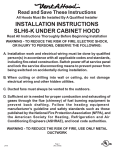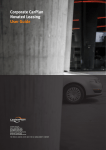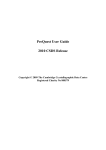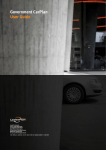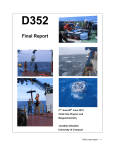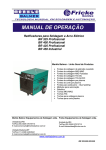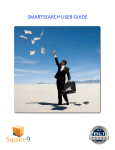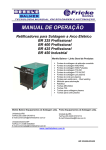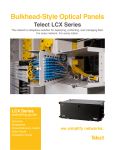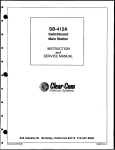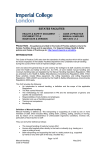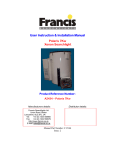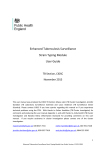Download SEE Welcome Guide
Transcript
190 School of Earth and Environment STUDENT GUIDE 2015 Honours Students Masters by Coursework and Dissertation Students 1 Contents Introduction to the School of Earth and Environment ........................................................................ 3 Your Research Experience .................................................................................................................... 5 Plagiarism ............................................................................................................................................. 6 Budgeting for your project ................................................................................................................... 6 General Information ............................................................................................................................ 6 After Hours Access ............................................................................................................................... 6 Security ................................................................................................................................................ 6 Mail ...................................................................................................................................................... 7 Telephone & Fax .................................................................................................................................. 7 Field, General and Laboratory Supplies ............................................................................................... 8 Cash Purchases..................................................................................................................................... 8 Seminars .............................................................................................................................................. 8 Laboratory Work and Resources.......................................................................................................... 9 Laboratory Organisation ...................................................................................................................... 9 Equipment Booking............................................................................................................................10 Computers/Email/Internet/Support Team ........................................................................................10 Vehicles ..............................................................................................................................................11 Workshops .........................................................................................................................................12 Library ................................................................................................................................................13 Occupational Health and Safety .........................................................................................................13 Emergency Procedures ......................................................................................................................14 Laboratory Safety ...............................................................................................................................15 Laboratory Planning and Risk Assessment.........................................................................................15 Safe Field Work ..................................................................................................................................18 Safe Office Work ................................................................................................................................19 Student/Employee Assistance Programme .......................................................................................19 Introduction Checklist ........................................................................................................................20 Departure Checklist............................................................................................................................20 Useful Websites .................................................................................................................................20 2 Introduction to the School of Earth and Environment The School is located within the Faculty of Science and comprises the disciplines of Geography, Geology and Geophysics, Soil Science and Land and Water Management. This unique combination of expertise spans physical, chemical and biological aspects of the environment as well as the impact of human activities on that environment: from deep rocks to regolith and soil surface to landscape processes, marine and environmental science to an understanding of the nature and function of past and present environments. The School emphasizes an integrated global perspective on issues posed by the Earth and its environment. The School is housed at two ends of the campus: the southern Soil Science building and the northern Geography-Geology complex and adjacent Robert Street Building (GP2). Some research staff and postgraduates are also housed in the Physics building and facilities are also located in the Civil Engineering building. Head of School – Professor Matthew Tonts Deputy Head of School – Professor Annette George Manager Strategy and Operations – Megan Jenkinson Geol / Geog / Robert Street Building (GP2) Team Leader Finance and Resources Christine Riordan Soil Science Building Administrative Assistant Julie Carless Management Support Officer Sandra Hamersley Team Leader Academic Support Helen Pelusey Administrative Officer Katherine Ward Administrative Officer -Academic Support Kim Crameri Administrative Assistant Marivic Weeratunga Purchasing Officer Tania New 3 Technical Operations Manager Bill Wilson Senior Scientific Officer Michael Smirk Senior Technician Frank Nemeth Scientific Officer Will Newton Fieldwork Coordinator Lorraine Wilson Technician Darryl Roberts Senior Technician Chris Brouwer Technician Kim Duffecy Louise Heyworth Laboratory Technician Centre for Exploration Targeting (CET) Director – Professor Cam McCuaig Business Manager – Gillian Evens Centre for Regional Development Director – Professor Matthew Tonts Centre for the Built Environment Director- Fiona Bull Centres Centre for Petroleum Geoscience and CO2 Sequestration Director – Professor David Lumley Business Manager – Alan Pitman Planning and Transport Research Centre (PATREC) Director – Professor Sharon Biermann Centre for Coral Reef Studies and Coastal Marine Systems Director – Professor Malcolm McCulloch Edward de Courcy Clarke Earth Science Museum Museum Curator – John Reeve Phone numbers, email addresses and mailbag details for all staff can be found by searching UWA Directory Assistance http://directory.uwa.edu.au 4 Your Research Experience This year will be a highlight of your university career. Planning and executing a university-level research project will provide you with an experience of great personal value whether the primary purpose is research training for higher degree studies or a prelude to the workforce. You will be the beneficiary of direction and assistance from many members of the School community, including scholars who are world leaders in their fields. However, any useful experience also includes responsibilities; so during the year you must remain mindful of the obligations you have to other members of the School and broader University community. Many of these are common sense, but University Statutes and legal obligations define others. It is the purpose of this manual to provide you not only with practical information to assist in your endeavors, but also to outline some of these responsibilities. A useful starting point for considering such things would be a realisation that you will be collaborating with other researchers and staff in the School. You can make this collaboration mutually productive by observing some simple guidelines. Do Plan well and finish data collection early enough to properly analyse and write up your results, and hand a draft dissertation to your supervisor(s) at least a month before final submission date. Interact with other people in the School over access to infrastructure and information Consult your supervisor(s) regularly. Attend seminars and other academic events. Do Not Be selfish: Don’t assume that the work of other people will stop to let you have full access to research infrastructure. Liaise with the other students and staff to fit in with what everyone needs to do, and be as flexible as possible. Delay: If you haven’t started project work by the start of July you may run out of time and place undue stress upon yourself and available facilities. Start early so you can do a good job and complete your project on time. Depart at the end of the year without cleaning up after yourself. 5 Plagiarism The University of Western Australia treats plagiarism as very serious misconduct. University regulations on plagiarism provide severe penalties, including expulsion from the University. Information on this is provided at http://www.student.uwa.edu.au/learning/studysmarter/getsmart/plagiarism Budgeting for your project The School has a limited budget to support undergraduate research projects. Presently each academic is allocated $300 per research student (please discuss this with your academic supervisor). Some fortunate students have project support from supervisors’ research funds or have won grants or prizes which subsidise the costs of their project. Basically what this means for you is that you need to make every effort to watch your costs and budget accordingly. This is an important skill and one that will be useful when you leave the University. The cost of carrying out your research project is equivalent to your ‘Operating Expenses’, ie. it includes all fieldwork or laboratory expenses, vehicle costs, travel, computer-related and office consumables (copying, printing, plotting etc). General Information Administrative Offices are generally staffed from 8.30-4.30pm. The points of contact in the School Offices are: Geography and Geology Building Marivic Weeratunga Soil Science Building Julia Carless ext 2666 ext 2503 After Hours Access Administrative staff can program your campus card to give you access to the areas you need and provide appropriate keys. Note that both keys and access-programmed campus cards form part of School Security and you are accountable for your handling of our security. In the event of losing your key(s) please inform your respective administration office as soon as possible. Loss of campus card requires you to immediately inform the “Campus Card Desk” on ext 2523. Outside office hours contact the Security Office below. Note that the use of hazardous chemicals or equipment, and access to certain high-risk labs, is prohibited outside of normal working hours – see the Laboratory Safety section of this document for further details. Security The security office (located with The Parking Office – near The Recreation Centre) offers a 24 hour emergency assistance (EMERGENCY ext 2222). In addition they provide advice on security and personal safety and can provide after hours escort to bus-stops or 6 cars. For more information go to http://www.security.uwa.edu.au/. Mail UWA provides mail services, for both “internal” (within campus) and “external” (off campus) mail. A mail bag, located near your administrative office, serves this function. Mail is delivered and collected twice daily, around 9am and 12-1pm. Mail bag numbers are required to identify a campus location. Our numbers are: Geology / Geography Building: M004 Soil Science Building Office includes Centre for Land Rehabilitation: M087 Internal mail. Internal mail is posted in re-usable envelopes (obtainable from your respective administration office). External mail. The school will pay for small items of mail. Larger items must have a “mail dispatch request” form attached to them (found in the administration office) and will charge costs to your associated accounts (note these must be specified on the form). If you need items couriered, please seek advice from your office staff. Private mail. Private mail can also be posted here if it is already stamped and addressed. Incoming mail. All incoming mail is sorted and placed into mail boxes located near the administration offices. Soil Science Building: Honours students do not have mail boxes – if you have any incoming mail the office staff will let you know. Geog/Geol/Robert Street Buildings (GP2): Honours students have a mailbox near the administration office. Students associated with the Centre for Exploration Targeting have mailboxes located on the first floor near the CET administration office. Telephone & Fax Telephones are available for making calls related to your work and for receiving calls. Necessary local private calls are permitted and payment for private phone calls should be made to your TAO / Admin Staff. The UWA internal phone lines are 4 digit interactive. If you wish to make a call outside the university you must dial 0 first, then the telephone number. Overseas (ISD), toll (STD) and mobile calls cannot be made unless you have been granted access to such privileges. Our phone system is touch-tone internally, but to generate tones on an external line you must press 9 once before entering the touch-tone digits. The fax machines work with the same 4 digit principal as the phones. For Overseas faxes you must dial 0, 0015, the country code, the area code and phone number. The phone system is logged and unrealistically high bills to individual phones will be questioned. 7 Field, General and Laboratory Supplies A wide range of consumables, chemicals and laboratory and field equipment is available. Contact technical and research staff in your laboratories for details. Geography/Geology/Robert Street Buildings (GP2) Materials can be ordered through Tania New (Purchasing Officer). Tania’s work hours are from 9.30am – 4.30pm on Monday Tuesdays and Wednesday so please endeavour to place your order on these days to minimize disruption to other office staff. Before you request a product please make sure you can provide the name of the company the company telephone / fax number a catalogue number or detailed description of the product a quote for costs (specifying GST inclusive or exclusive) A comprehensive range of catalogues is available from Bill Wilson ([email protected]) Soil Science Building The general, glass and chemical store will provide you with the majority of supplies you need (see noticeboard outside of the administration office for opening times), over and above what is already in your research laboratory. Other purchases should be made through Tania New (Purchasing Officer) who has a comprehensive range of catalogues. Be sure to complete a “requisition form” specifying all relevant details (see above list). This will require authorization from your academic supervisor. Cash Purchases Other items can be bought with your own money and claimed back through the School’s petty cash float. There can be no re-imbursement without a tax receipt and as the charge will be transferred to your operating account you must ensure you have your supervisor’s permission to make the purchase. Take the approved receipts to your respective administrative office to get your expenditure reimbursed. The limit on this type of purchase is $20. All amounts >$20.00 should be written up as an “Expense Claim”. The forms for this can be obtained from your respective school administration office. Fill out and sign the form and give it to the Tech Admin Officer/Purchasing Officer for processing. Please note that your supervisor must sign these claim forms. You should provide your own basic stationery such as writing pads, pens and pencils, Seminars There are a number of seminar series which you are strongly encouraged to attend. Of particular importance are the seminars for the discipline with which you are affiliated. These include postgraduate presentations and give you a good opportunity to find out the breadth and depth of current research work in the School in a fairly painless way. You are encouraged to contact the School Postgrad Representatives to be included on their email list which includes notices of seminars and other activities every month. Contact: Rachel ([email protected]); Sean ([email protected]); Fiona ([email protected]) or Genevieve ([email protected]) 8 Laboratory Work and Resources If your project involves laboratory work you must speak to the person in charge of the particular laboratory or the appropriate Senior Scientific Officer. Geog/Geol/Robert Street Buildings (GP2): B.Wilson ([email protected]) Soil Science Building: M.Smirk ([email protected]) The School has access to a diverse range of laboratory resources and equipment. Details are available at http://www.see.uwa.edu.au/research/overview-of-facilities Please remember that technical assistance within the School is limited so it is your responsibility to wash up, put equipment away and wipe lab benches at the end of each day. Notebooks Laboratory or field notebooks provide the definitive record of your research work. The University has strict requirements concerning data storage and retention that are available at http://www.research.uwa.edu.au/staff/research-policy/guidelines In both academic and industrial settings the notebook is a legal document. For example, patents are granted on a first to invent basis, so it is not surprising that laboratory notebooks are occasionally subpoenaed. Papers or reports found to contain information not in your notebook could be considered fraudulent. Laboratory Organisation Geography/Geology and Robert Street Buildings (GP2). These buildings house a range of specialised geotechnical laboratories as well as generic project laboratories for use by honours, project and postgraduate students. Comprehensive workshop facilities are also available. Academic or senior technical staff supervise these laboratories. For further information contact Bill Wilson ([email protected]). Laboratory Induction is mandatory prior to any work being undertaken in the labs. This building also houses a range of mostly wet-chemical laboratories with some areas specialised by function and a few highly specialised analytical equipment laboratories. Each research group will have responsibility for one or more laboratories. Every laboratory has an Academic Supervisor and a Laboratory Supervisor. The Laboratory Supervisor is usually a staff member, but may be a PhD student, with the responsibility of inducting staff, students and visitors into their lab and explaining the rules of use. You will generally work in the research laboratories of your academic supervisor. Also you can use the student laboratories or other research laboratories should it be necessitated by the work you are doing. At all times authorisation from the relevant laboratory manager must be sought prior to commencement of work in a new laboratory. The analytical laboratories are shared facilities and managed by Michael Smirk. Any use of equipment in these laboratories must be authorised by Michael Smirk, Darryl Roberts or Kim Duffecy. 9 Research Group Geomorphology Soil Chemistry Microbial Ecology Soil Physics Plant Nutrition Soil Biology Academic Supervisor Matthias Leopold Andrew Rate Lyn Abbott Gavan McGrath Zed Rengel Louise Barton Laboratory Manager Michael Smirk Michael Smirk Ian Waite/Zakaria Solomain Gavan McGrath Paul Damon Yoshi Sawada Each lab has slightly different rules specific to the type of work done. You are not permitted to begin work in any laboratory until you have completed your induction and the ‘Sign-On’ sheet to say that you have understood the instructions and safe working requirements. When you leave, you will also fill out a ‘Sign-off’ sheet to say that all your equipment and samples are returned, discarded or stored appropriately. For further information contact Michael Smirk (email [email protected]). Equipment Booking Because of high demand much equipment and certain laboratories need to be booked in advance. A booking sheet or diary is usually located in the relevant lab. In all cases, the rules are the same: Book what is needed. Booking a day when you need it for 30 minutes is not acceptable. Write your name clearly with a contact phone number. If your plans change and you will be late for your booking or will not be using it, then rub it out or label it ‘cancelled’ in the booking sheet. If you do not show up within 30 min of your booked time and others want to use the facility, may take your place on the equipment. If the equipment is not working properly, or you have an accident and damage it, report it immediately to minimise downtime for yourself and others. Computers/Email/Internet/Support Team The School supplies computers for undergraduates, postgraduates and visitors. These are kept in shared spaces (computer rooms) to allow maximum access by students. Please note that as an undergraduate you need to utilize the computers that have been allocated for you. Do not use postgraduate computers unless given permission by Administration. Computer access Northern Campus The Computer lab is located in room 1.40 in the Geography /Geology Complex. In order to use these computers you must apply to your computer support team for a Username and Logon. Computer access Southern Campus You may use the Undergraduate Computer Laboratory in the north block of the ‘Agriculture Complex’. Access here is only permitted when there are no classes in progress. There is no storage of files on the computers and you cannot change the desktop, settings, or load software from other sources. You will need a domain account to 10 log on to the computers (there is an application form in the Administrative Office) a campus card programmed to get into the laboratory (see administrative staff), and a clean (virus free) disk or USB thumb drive or similar to store your work. Remember that each laser-printed page costs 10c plus GST, so do not waste scarce resources. Email All students currently enrolled at The University of Western Australia are automatically assigned an email address. It is essential that you use this email address, as it will be used by the University for official correspondence with you, such as HECS information, exam information and Library Notices. The UWA Student Email System is a comprehensive student communications and collaboration suite. You can access your Student Email System account via MyUWA. For information go to: http://www.its.uwa.edu.au/student/email Please let your respective administration office know your current email address to ensure you are on School mailing lists and do not miss vital information. If you wish to broadcast an email to the School, or a group within the school etc. forward your email to your respective administrative officer. Computer support All IT related enquiries and requests should be directed to the IT Contact Centre. Each of these methods assigns your job an incident number in the IT Service Desk. All information is provided at http://www.is.uwa.edu.au/it-help Internet access The School pays for computing costs. You should note however, that if you exceed the $10 per month threshold (which permits downloads up to 200MB) your associated project allowance will be charged. Private use of the web All usage of the Web must be work related. Access is given only after you have signed an agreement to this effect. All computers are connected to local printers. Vehicles The School’s fleet comprises the following vehicles: Vehicles parked alongside the combined workshop 2 Holden Colorado Crew Cab Utility (manual) 1 Holden Omega Sports (automatic) Vehicles parked in Service bays near Geology / Geography Buildings 1 Subaru Forester Wagon (automatic) 1 Commodore Wagon (automatic) 2 Toyota Land Cruisers 2 Toyota Land Cruiser Wagons 2 Minibuses (each seats 11 people) 1 Trailer Only people with valid Australian and International licences (C class) may use these 11 vehicles. You will be asked to provide a copy of your licence before taking a vehicle out, for the first time. You must complete the 4WD-training course before you can take a vehicle “off road”. You can book vehicles through either school administrative office with approval from your supervisor. Before using a vehicle you are required to inspect the vehicle for damage and roadworthiness, and also to ensure it meets any requirements specific to the planned journey. Any damage must be reported immediately to your respective administration office and recorded in the vehicle’s log-book. By reporting pre-existing damage you are protected from being held responsible for it. When using a vehicle ALWAYS complete the vehicle log book. Ensure you specify the odometer reading, the appropriate project for charging and note any damage or other problems. Fuel is purchased using the fleet fuel cards and PIN provided in either the log book or service manual in the glove box. The cards are Star (Caltex and Ampol) or Shell. Please keep fuel receipts with the cards. If you have an accident or problem with a vehicle please report it. If you mess up or dirty a vehicle please clean it. If you utilise anything from the vehicle (eg first aid kit or tool kit) please report it. Alternative Vehicle Bookings If all our vehicles are fully booked, you can book alternative vehicles in Plant Biology (contact Pauline Yueng or Anna O’Connell x2545) or Animal Biology (Natalie Byrne x2228). 4WD course This course is offered by the Safety and Health Office at UWA (x3938). Information can be obtained from http://www.safety.uwa.edu.au/courses/4wd Courses are generally only run twice a year, often in April and June. If you need to use a 4WD PLEASE enrol yourself in a course as soon as possible (complete enrolment form at above URL or contact Lorraine Wilson). Authorisation from your academic supervisor will be required. Field Expenses Expenses, such as overnight accommodation costs, incurred during the trips can be reimbursed from the Admin Offices on presentation of receipts for all transactions and a completed expenses claim form. Ask your mentor or Admin Offices how the system works prior to the field trip. Receipts: Be sure to get a tax invoice describing the good(s) and stating or indicating the GST component. Workshops SEE has two main workshops: one is located in the Geography/Geology building (room G23) while Ray Scott and Darrell O’Reilly run the faculty workshop (situated adjacent to the Biology building, opposite the glasshouse area). These workshops provide invaluable services, ranging from general maintenance to electrical and mechanical expertise. Charges for these services exist, as the workshops operate on a cost–recovery basis. 12 Library In your previous undergraduate years you should have become familiar with the University Libraries www.library.uwa.edu.au In addition to the library the School has a collection of past 4th year projects, honours, Masters and PhD theses that can be borrowed through the secretary (Soil Science Building) or from John Reeve in the Geology Museum. Library photocopying and printing Often you may wish to photocopy information from within the library (especially journal, reserve and map items which cannot be borrowed) or print electronic copies of articles. In order to photocopy you must either have a Transaction Card or a Campus Card. Transaction cards can be bought for $3 from an autoloader machine and copy money can be uploaded to them (receipts will be issued and should be kept for reimbursement purposes). Note you need coins to buy the card, as autoloaders cannot give change. Please note that this card does not have a PIN. Therefore it can be treated as cash by a finder should you lose it (so don’t load too much money onto it). Campus cards have 2 built in ‘purses’, which allow for School or personal money allocation. To add money to your campus card ‘School purse’; you can either upload it yourself (keeping the receipt) using an autoloader machine or you can obtain a T form from your Admin Officer (this is done by the Copying Services Office on the ground floor of the Reid Library). Campus cards also allow printing privileges within the library system. Occupational Health and Safety The University’s Occupational Safety and Health Policy and the WA Occupational Health and Safety Act (1986) make it clear that staff and students are obliged to: Take reasonable care of their own safety and health, and that of others. Follow all safety and health policies and procedures. Report all known or observed hazards, incidents and injuries. The University acknowledges that the provision of a safe and healthy work environment for employees, students, contractors and visitors is not just a moral and legal responsibility but also a prerequisite for it to achieve its primary mission of conducting teaching, research and scholarship at the highest international standards. This commitment to protecting its human resources also extends to ensuring the University’s operations do not place the local community at risk of injury, illness or property damage. Further details can be found at: http://www.safety.uwa.edu.au/policies/occupational_safety_and_health School Safety Personnel Safety Officers Geog/Geol Building Bill Wilson, Room G.16, ext 2710 Mobile 0419045337 Soil Science Building Michael Smirk, Room 1.210, ext 7133 13 Fire – Building Wardens Geog/Geol Building Robert Street Building (GP2) Soil Science Building Bill Wilson, Room G.16, ext 2710 Mobile 0419045337 Cindi Dunjey, Room 1.16, ext 2640 Michael Smirk, Room 1.210, ext 7133 First Aid Officer Bill Wilson, Room G.16, ext 2710 Mobile 0419045337 Note that a number of staff and students at both ends of School hold either the St John Senior First Aid Certificate or the Workplace First Aid Certificate Health and Safety Representative Bill Wilson, Room G.16, ext 2710 Mobile 0419045337 Emergency Procedures Medical emergency Immediately phone 2222 (from a campus phone) or freecall 1800 655 222 (from a public phone on campus). Your call will be answered by Security for priority attention. Give your name, location, number of people involved and details of medical emergency. Await further instruction and advice. Render whatever assistance you can. Contact the School’s First Aid Officer (see list above) Other Emergencies Provided it is safe to do so: Move persons away from any danger Call 2222 (from a campus phone) or 1800 655 222 (from a public phone on campus). Your call will be answered by Security for immediate attention. Fire and Building Evacuation The signal to evacuate your building will be either: The sounding of the fire alarm bell or evacuation tone A verbal directive issued by a Fire Warden or member of staff In the event of an evacuation you should quickly vacate the building by the closest available exit or by an alternate exit as advised by a Fire Warden. DO NOT USE LIFTS. Upon evacuating your building you are required to proceed to an Evacuation Assembly Area. Building Assembly Area Geography/Geology The big rock on the lawn at the front of Geology Robert Street (GP2) Car park 19 Soil Science The Cottage (north/east end of building) You are not permitted to re-enter the building until notified by the Chief Fire Warden. Do not leave the assembly area until notified by the Chief Fire Warden Incident Reporting It is essential that all accidents or hazards are officially reported in order to protect personnel as well as meet the University’s legal requirements. 14 Hazards Report any hazards to the person directly responsible for the area. If you feel the hazard has not been addressed properly, fill in a hazard report form and hand it to the relevant School Safety Officer. Hazard report forms are available from: http://www.safety.uwa.edu.au/incidents-injuries-emergency/notification If the hazard constitutes an emergency call 2222 (from a campus phone) or 1800 655 222 (from a public phone on campus) as indicated under other emergencies above. Accidents Fill in an accident report form and then hand it the School Safety Officer. Forms are available from: http://www.safety.uwa.edu.au/forms/incident Laboratory Safety The following points apply to all laboratories in the School. UWA laboratory safety policies apply also and are found at: http://www.safety.uwa.edu.au/policies Laboratory Specific Inductions Individual laboratories may be subject to local rules or induction procedures. Contact Michael Smirk (Ext 7133, Room 1.210 [email protected] ) in the Soil Science Building or Bill Wilson (Ext 2710, Room G.16 [email protected]) in the Geography/Geology building for further information. Authorised and Unauthorised Experimentation Students at all levels are only authorised to perform laboratory work directly related to their own course of study. Academic and laboratory supervisors must be consulted if any significant deviation from proposed work is planned. After-hours laboratory work After hours work involving hazardous chemicals or equipment is prohibited. Chemicals are deemed to be hazardous if they have a Red rating on ChemAlert http://www.safety.uwa.edu.au/topics/chemical/chemalert or are classified as such by NOHSC. Hazardous equipment includes, but is not limited to, things such as centrifuges, autoclaves, distillation equipment or equipment utilizing liquid or compressed gases. Laboratory Planning and Risk Assessment You are required to assess all work for potential hazards as a normal part of your research proposal. You must never start any laboratory work unless you fully understand the procedure and its consequences and have addressed all foreseeable hazards with appropriate controls. If you have any doubt about the consequences of a laboratory procedure you must seek advice from your supervisor or experienced Technical Staff. UWA hazard identification and risk assessment guidelines are given at http://www.safety.uwa.edu.au/topics Standard Operating Procedures (SOP’s) SOP’s are written instructions that outline the preferred method of performing a task in order to minimise the risk of harm to personnel, infrastructure or the University; as well 15 they provide concise operating instructions. The University requires that SOP’s be developed for all techniques, processes, equipment and machinery where a risk exists. If SOP’s are not available in your area consult your Supervisor. UWA SOP guidelines are given at: http://www.safety.uwa.edu.au/management/toolkit Appropriate Personal Protective Equipment (PPE) PPE must be worn at all times. PPE includes lab coats, aprons or coveralls, gloves and safety glasses/face shields. Be aware that the protection afforded by plastic, latex and rubber gloves to common chemicals is highly variable. Chemical resistance data for a wide range of glove types is given at: http://www.ansell-edmont.com/specware/index.asp Footwear You are required to wear closed footwear while working in any School laboratory (computer laboratories excepted). Note that some specific laboratories may require a higher standard of protective clothing and equipment where the risk is higher. Contact Lenses Contact lenses present a particular hazard in laboratories and should not be worn unless it is absolutely essential. Contact lenses, particularly soft lenses, can absorb and concentrate gases and vapours and cause serious eye injury. General Laboratory Safety Considerations Good housekeeping is essential for accident prevention. This includes: Benches should be kept as clean and tidy as the work allows. Workers are responsible for maintaining their areas in a clean and tidy condition Any service (water, lights, reticulated gas, etc) you require to be left in use while unattended must carry a signed and dated notice that advises others to ‘Leave On’. Samples or other materials retained by a student for future use must be stored in a suitable container and properly labelled. The label must be affixed to the container with full details of its contents as well as the name and full contact details of the owner. Glassware and other equipment should be washed or cleaned and put away at the end of each session. Note that many labs have very specific requirements for washing glassware. Familiarise yourself with the location of fire extinguishers and other safety equipment in your laboratory. Ensure that corridors and fire escapes remain uncluttered and that quick access to and from the building is not compromised. Never run in laboratories or along corridors. Never store, handle or consume food or drink in laboratories. Sandals, thongs or open toed shoes must not be worn in laboratories. 16 Chemical Handling and the MSDS You are required to be aware of the physical, chemical and toxicological properties of all chemicals you plan to use as well as appropriate methods to handle and dispose of them. This information, in the form of a Material Safety Data Sheets (MSDS), is available for all commercially supplied chemicals. It is mandatory for laboratories to have a copy of the MSDS available for each chemical housed therein. Whilst chemical suppliers are obligated to supply a MSDS for each chemical they have supplied, it is often quicker to download these from http://www.safety.uwa.edu.au/topics/chemical/chemalert Note that Americanised spelling is required for successful searches, ie Sulfur not Sulphur. Chemical Storage Chemicals must be stored in appropriate conditions based on their physical and chemical properties. Limited storage advice is provided on the MSDS. Seek advice from experienced Technical Staff or the University’s Chemical Safety Officer on chemical storage matters. In summary, mutually reactive materials must be segregated - it is therefore dangerous to store the following materials in close proximity: Strong acids and bases or oxidizing agents and fuels. Strong acids with ammonia. Perchloric acid with fuels, acetic anhydride, or drying agents such as sulphuric or phosphoric acid. Nitric acid with fuels. Hydrogen peroxide with fuels (particularly acetone). Benzyl peroxide or sodium peroxide with fuels. Permanganates with glycerols, glycols or other fuels. ‘Fuels’ include all combustible materials including organic solvents, oils and fats, wood, paper and plant material, and certain metals (especially powdered metals). The above list is not comprehensive and expert advice should always be obtained. Note that many compounds have a dual character. Perchloric acid is a strong mineral acid but is also a high-energy oxidising agent. Glacial acetic acid is a fuel as well as a hazardous acid. Storage of these two acids together could result in fire or explosion. Further advice on handling and storage is available at: http://www.safety.uwa.edu.au/topics/chemical Chemical Disposal Consult with either Bill Wilson or Michael Smirk prior to the disposal of any chemicals. Special treatment may be required for some chemicals, which can be very costly. Ensure that your planning is thorough, and where possible you avoid any need to use chemicals that may be costly to dispose of. For further information consult the following URL for chemical disposal information http://www.safety.uwa.edu.au/topics/waste Radiation Safety The use of non-ionising or ionising radiation poses health risks should exposure occur. The health risks may vary widely in both onset and severity and as such the use of equipment or materials that produce such radiation is covered by legislation: ie The Radiation Safety Act 1975 and the Radiation Safety (General) Regulations (1983-1997). 17 Further information regarding the act and regulations is at http://www.safety.uwa.edu.au/topics/radiation Within the School of Earth and Environment there are items of equipment and substances available for use that are covered by the above legislation, and as such special protocols exist for the safe use of such equipment. General information and specific policy is available from the university Health and Safety website. Relevant examples include: X-ray fluorescence and diffraction spectrometers http://www.safety.uwa.edu.au/topics/plant/x-ray Unsealed radioactive isotopes http://www.safety.uwa.edu.au/topics/radiation Lasers: http://www.safety.uwa.edu.au/topics/radiation/lasers Ultraviolet light / transilluminators http://www.safety.uwa.edu.au/topics/radiation/non-ionising/uvtransilluminators Neutron moisture gauges http://www.safety.uwa.edu.au/topics/radiation/radioactivematerials/moisture-density-gauges Additionally the University Safety and Health Office run courses that cover the safe use of unsealed isotopes (3 days) and x-ray analysis safety (half day). Course numbers may be limited so early bookings are essential. They are generally run only twice a year. Safe Field Work Staff and students who conduct field trips or carry out work in remote locations must be aware that they place themselves in a situation where they are exposed to higher than normal levels of risk. UWA’s policy on working in remote locations and fieldwork can be found at http://www.safety.uwa.edu.au/policies/remote http://www.safety.uwa.edu.au/policies/field_work These policies must be adhered to and a Field Work Plan and Risk Assessment and must be drafted and signed off by the Head of School prior to departure. In addition a Field Work Participants form must be completed by each participant. Contact Lorraine Wilson to obtain these forms and for any advice. You are required to follow these steps when working in the field: Carry water Wear suitable clothing (including a hat) to avoid heat or low temperature stress Carry sun protection cream Carry rehydration salts and fluid People working in remote areas must be qualified in first aid Let someone know where you will be Inform someone of an expected return time Carry a fully stocked first aid kit and a snake bite kit (available from the First Aid Officer) Have someone with you (two other people would be ideal, but at least one) Have basic training in first aid, 4WD handling. Take a satellite phone with you if possible 18 The University has specific policies dealing with fieldwork at remote sites and the use of 4WD vehicles. These are available at http://www.safety.uwa.edu.au/topics/offcampus/driving and must be consulted by all persons considering field work. Also note that you are not permitted to use a university 4WD vehicle unless you have completed the University’s 4WD course http://www.safety.uwa.edu.au/induction-andtraining/courses/4WD Safe Office Work Injuries resulting from improper lifting and handling of objects are very common at UWA. The proper procedure to handle a heavy object involves the following steps: Assess the load you plan to lift. Get help or a trolley if you need it. Bend your knees and lift with your legs Keep the load close to your body. Don’t twist your body while holding a load. Further information is at http://www.safety.uwa.edu.au/topics/physical/manualhandling Computer Workstation Ergonomics To avoid injury it is essential that your desk, seat and associated computer equipment is properly set up. Comprehensive information to assist setting up computer workstations is given at http://www.safety.uwa.edu.au/health-wellbeing/physical/ergonomics/workstation Student/Employee Assistance Programme The University’s Employee Assistance Programme provides confidential and professional assistance for employees, and to other persons whose care is the responsibility of the employee, who are experiencing difficulties of a personal or workrelated nature. Details are available at: http://www.safety.uwa.edu.au/healthwellbeing/health/eap Take the time to read any of the policy documents that may be specific to your research. Discuss with your academic supervisors whether any laboratory or field techniques likely to be undertaken may use any of the aforementioned equipment or substances. Seek advice from relevant technical or research staff prior to undertaking any work involving radiation sources. Ensure that you undertake any of the relevant courses run by University Safety & Health before equipment is used. 19 Introduction Checklist Meet Administrative Staff Get building access on campus card and obtain necessary keys Meet respective laboratory managers Departure Checklist See following page Useful Websites UWA homepage http://www.uwa.edu.au Directory page http://www.directory.uwa.edu.au/ Faculty web page http://www.science.uwa.edu.au School web page http://www.see.uwa.edu.au/ Library http://www.is.uwa.edu.au/ Security and Parking http://www.security.uwa.edu.au Student Services http://www.student.uwa.edu.au/contact/studentservices 20 School of Earth & Environment – Departure Form To be completed by staff, students and visitors leaving the School of Earth & Environment Name Forwarding address (including email) Supervisor (UWA) Please check, tick and sign this list and return to the School Manager. Have you: Returned all keys to the administrative assistant? Paid for any phone calls/faxes/books ordered? Notified Computer Support to close your network login account? (ext 2999) Returned the computer/laptop? Returned all Computer Software? You must not take any software that is held under UWA licence. Removed all files from the hard drive of your computer/servers? Returned UWA equipment to supervisor Returned all books? Cleaned your office (desk and shelves) and is it ready for the next user? Returned all library books/papers? Given an electronic archive of data (spreadsheets, graphs, thesis on CD) to your supervisor? Cleaned your working space in the lab? Emptied, washed, dried and stored appropriately all glassware, sample holders you have been using Returned unused chemicals to the shelves if required in future or dispose of in consultation with your supervisor? Listed and identified all the chemical waste you have? Washed/discarded sample vials (as appropriate)? Washed used sample racks and put them back into the storage area Taken all lab ware out of acid baths/wash buckets Removed from Fume cupboards – all the things you were using? Emptied your material from fridges, freezers, incubators, drying ovens and other storage? Checked and removed your material from cool rooms? * Archived rocks, soils, clay separates, etc. Inform supervisor of their location Archived thin sections Cleared outside rock lockers and shed Cleared short-term rock and soil store Archived coral slices Archived coral specimens Disposed of obsolete samples Archived coral cores Destroyed quarantine samples according to regulations (inform supervisor and Bill Wilson Labelled radiation monitoring badge with “NO LONGER REQUIRED” * For PhD students, only necessary samples are retained until you are admitted to degree. Please clearly label and identify all samples with a disposal date together with your name and supervisor’s name Any material not clearly identified and labelled will be discarded Student/Visitor/Staff signature Date Supervisor’s signature Date 21





















